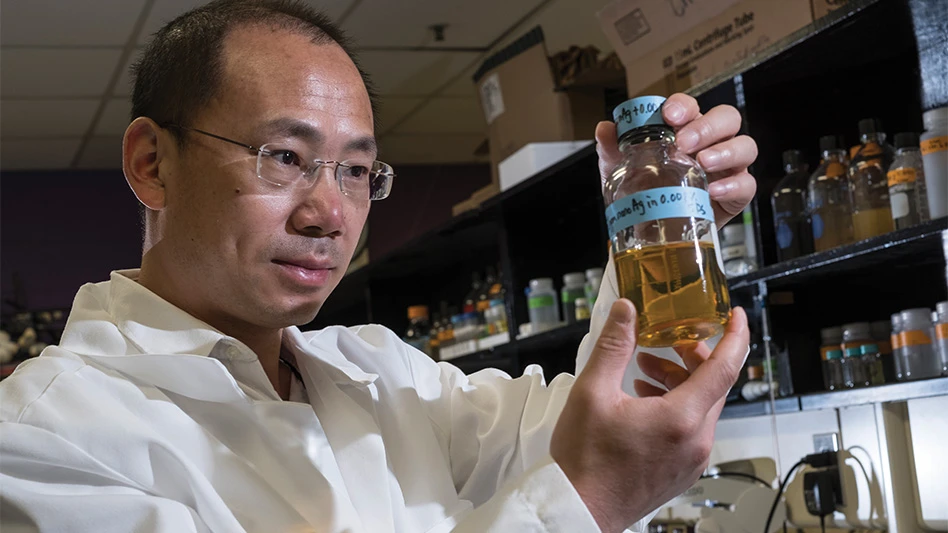
Michigan State University
EAST LANSING, Mich. — A Michigan State University research team has received a $611,000 grant from the U.S. Department of Agriculture’s (USDA) National Institute of Food and Agriculture to examine crop uptake of heavy metals, such as arsenic, cadmium and lead.
The project is led by Wei Zhang, associate professor and associate chair in the Department of Plant, Soil and Microbial Sciences.
In addition to Zhang, the team is composed of scientists representing four MSU departments, and each member is also supported by MSU AgBioResearch. They are:
- Zachary Hayden, assistant professor in the Department of Horticulture.
- Hui Li, professor in the Department of Plant, Soil and Microbial Sciences.
- Kurt Steinke, associate professor and MSU Extension specialist in the Department of Plant, Soil and Microbial Sciences.
- Felicia Wu, John A. Hannah Distinguished Professor in the departments of Food Science and Human Nutrition, and Agricultural, Food and Resource Economics.
In 2021, the U.S. Food and Drug Administration (FDA) released an action plan called Closer to Zero geared toward reducing contaminant exposure from foods, especially those commonly consumed by infants and young children.
The initiative came on the heels of a 2021 congressional report on the neurological and developmental dangers of high levels of arsenic, cadmium, lead and mercury in store-bought baby foods.
Zhang said it is anticipated that over the coming years, the FDA will create guidelines on maximum allowable levels of these heavy metals in foods. This will have significant consequences for farmers and food processors.
“To ensure a safe food supply, it is crucial to understand what drives crop uptake of heavy metals, which is extremely complex and varies by crop species, soil type, field topography and climatic conditions,” Zhang said. “We recognize that solutions to this problem require stakeholder collaboration across entire food supply chains.”
The new USDA-funded project builds on ongoing research that includes various team members. Zhang, Hayden, Li and Steinke are testing the effectiveness of soil amendments on minimizing carrot uptake of multiple heavy metals, which is funded by a Specialty Crop Block Grant through the Michigan Department of Agriculture and Rural Development.
“Michigan carrot growers annually produce more than 52,000 tons of processing carrots, consistently striving to deliver a safe and wholesome ingredient to processors,” said Jamie Clover Adams, executive director of the Michigan Carrot Committee. “Our initial year of the Specialty Crop Block Grant has revealed that multiple factors influence the uptake of heavy metals in carrots. This research is a good start to helping growers better predict potential uptake risk at the time of field selection and manage uptake risk during carrot growth, but it’s only the beginning. The USDA funding represents the crucial subsequent phase that will equip Michigan carrot growers with the necessary information to provide an even safer product to consumers in the future.”
For another project through the Institute for the Advancement of Food and Nutrition Sciences, Zhang, Li and Wu are assessing cadmium exposure from rice, spinach and other crops as part of the Closer to Zero plan. Lastly, Zhang and Li are applying innovative machine learning techniques to predict crop uptake of contaminants more accurately. Machine learning is able to consider an array of climate and human activity factors, as well as complex interactions among heavy metals, plants and soils.
Latest from Quality Assurance & Food Safety
- Chef Robotics Introduces Pat-Down Capability for Meal Presentation and Sealing
- USDA Launches Regenerative Pilot Program
- Indoor Ag-Con Adds Food Safety Track to Conference Lineup
- IDFA Recognizes Federal Officials for Support of U.S. Dairy Industry
- Tetra Pak Acquires Bioreactors.net
- Fresh Del Monte Receives Rabobank Leadership Award
- São Paulo Earns Guinness World Record for Largest Municipal Food Security Program
- KPM Analytics Releases Ready-to-Use NIR Calibration Packages





